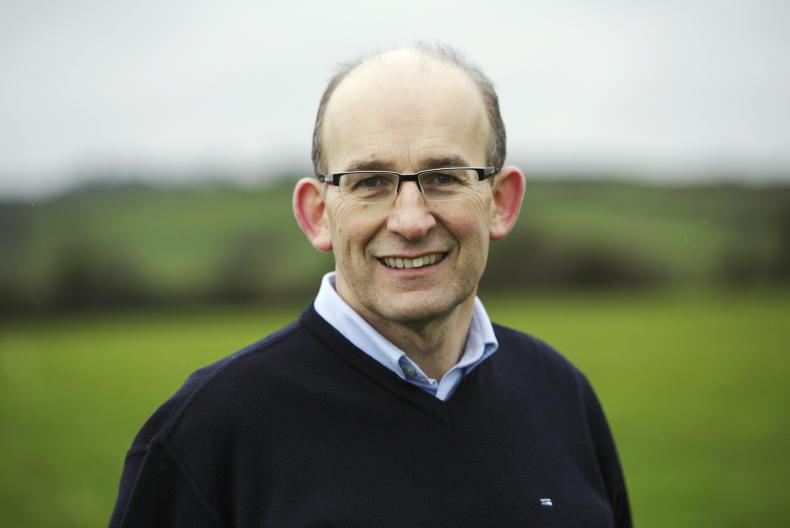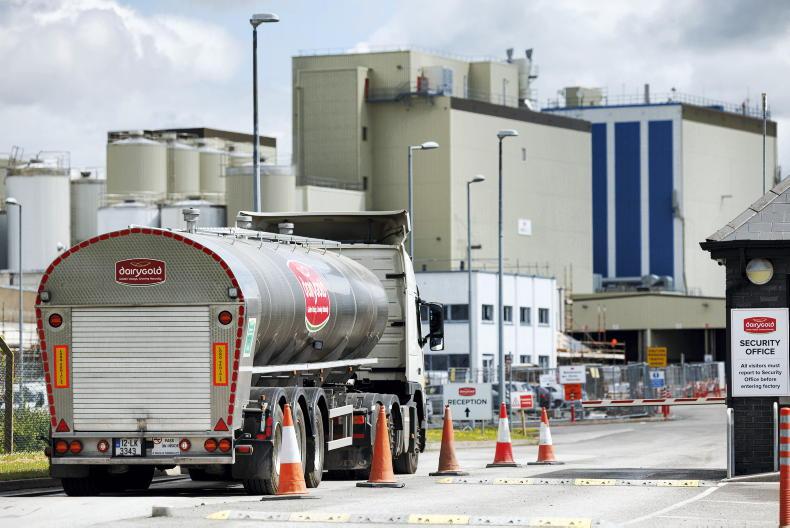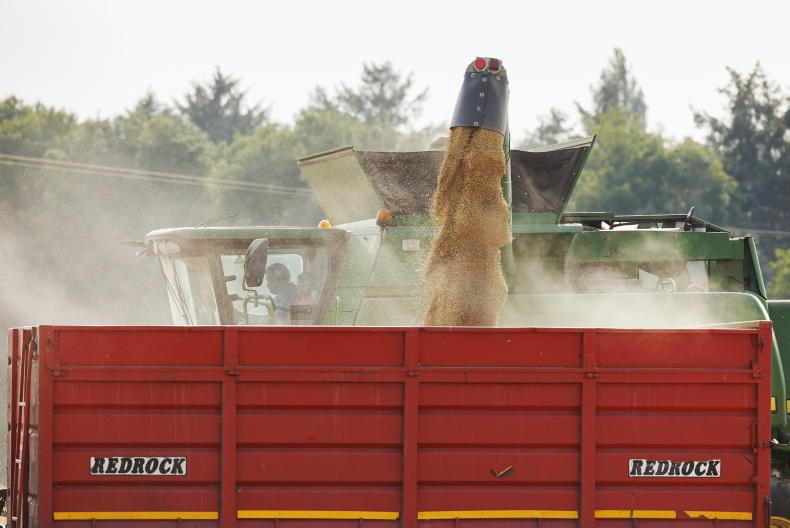Dairygold Co-op recorded a strong underlying performance for its 2020 financial year despite the unprecedented challenges created by COVID-19.
The Cork-based co-op reported a 9% increase in underlying earnings (EBITDA) to €50.3m in its core dairy processing business thanks to improved efficiencies and a sharp drop in working capital requirements.
Earnings margins in Dairygold’s core dairy business stood at 4.9% last year, which was up from 4.5% the year previous.
Dairygold chair John O’Gorman described the co-op’s 2020 financial results as a very good performance in what was a very challenging year for any business.
Profits
On a reported basis, Dairygold recorded a 27% decline in operating profits to €26m last year, as operating profit margins narrowed to 2.6% for 2020. Overall, the co-op reported a pre-tax profit of €21.8m, which was down 41% on the previous year.
However, the drop in reported profits is down to a number of exceptional items, including once-off restructuring charges, a significant hike in depreciation charges and reduced sales of non-core property assets.
During 2020, Dairygold said it completed an end-to-end review of the business, which resulted in a once-off restructuring charge of €4.8m. Dairygold chief executive Jim Woulfe said the review had finetuned the business and ensured Dairygold emerged from COVID-19 leaner, fitter and more efficient.

Jim Woulfe, chief executive of Dairygold. \ Donal O'Leary
The co-op said it had also incurred increased depreciation charges last year of about €7m following the completion of its extensive capital investment programme over the last decade. Overall, Dairygold management said it was very pleased with the underlying performance of the business last year, particularly from a cash generation and working capital perspective.
Woulfe said the co-op had reduced its working capital costs by almost €26m last year as it converted product stocks into cash sales faster than ever with 240,000t of dairy product sold.
The strong cash generation also helped Dairygold to reduce its net debt last year to just over €119m, leaving the co-op with a manageable net debt to earnings ratio of 2.2 times. The co-op’s net asset value by year-end increased 4% to just under €388m.
Milk supply
In total, Dairygold recorded full year sales of just over €1bn, which was in line with the previous year. Higher sales volumes of product more than offset weaker prices for most dairy commodities.
Dairygold processed a record 1.43bn litres of milk in 2020, as milk collections from farmer suppliers increased 3% in the year.

Dairygold milk tanker.
The co-op says base price for 2020 at standard solids of 3.3% protein and 3.6% fat was 28.3 c/l (excluding VAT and quality bonuses), which it says was marginally behind 2019 price. Woulfe said dairy markets in 2020 were down overall compared to the previous year by as much as 5%. However, he added that dairy markets had shown great resilience last year as they recovered strongly from the price shock in April as COVID-19 hit Europe.
Despite the challenges created by COVID-19, Dairygold’s core dairy business, which includes both its primary dairy business in Ireland and its overseas cheese businesses, recorded a 1% increase in sales last year to €760m.
Dairygold’s cheese business in the UK and Germany had a more difficult year given its significant exposure to food service and hospitality customers
Within this division, Dairygold’s dairy ingredients business in Ireland, which manufactures milk powders, cheese and butter at its various facilities in Cork, saw its sales grow by 5% last year to €632m.
In contrast, Dairygold’s cheese business in the UK and Germany had a more difficult year given its significant exposure to food service and hospitality customers and it saw its sales fall 14% in 2020 to €128m.
Efficiency
During the year, Dairygold invested €5m in its cheese facility in Leeds to improve efficiency and new product development.
Away from its core dairy operations, Dairygold’s agribusiness division recorded sales of €244m for 2020, which was in line with the previous year.
While volumes of animal feed and fertiliser were steady at 400,000t, Dairygold said total sales of feed and fertiliser were down €11m last year due to cheaper prices, particularly for fertiliser.
However, this drop in sales for feed and fertiliser was offset by an €11m increase in retail sales, with exceptionally strong demand for amenity products, gardening essentials and DIY products last year. Dairygold said it also completed the rationalisation process of its network of stores in 2020 and will maintain a network of 26 stores from now on.
Over recent years, Dairygold has begun a process of selling its non-core property assets
Outside of its core business, Dairygold also holds non-core assets such as property and financial investments valued at a combined €69m. Of this, the co-op holds property assets valued at €45.6m and financial assets such as shares and investments worth €23.3m.
Over recent years, Dairygold has begun a process of selling its non-core property assets. In 2019, the co-op had realised over €26m from the sale of properties such as Trinity Quarter in Cork city, as well as other properties in Midleton and the Netherlands.
However, given the market uncertainty last year due to COVID-19 Dairygold held back from a number of property sales.
This meant income from non-core assets halved last year to €13m, which is one of the main reasons for the reduced profits on the co-op’s bottom line.
Member funding
During 2020, Dairygold initiated the process of repaying funds to co-op shareholders from its revolving fund facility, which it established in 2013 to help fund its expansion programme.
Dairygold repaid €4.2m from its revolving fund to farmer members last year, and will issue a further €4.5m in repayments this year.
Over the last decade, Dairygold and its strategic partners TINE and Ornua have invested €425m in expanding processing capacity at its network of sites. Last year, the co-op completed the second phase of its post-quota expansion programme, and now has enough processing capacity in place up until 2025 at the very earliest.
Dairygold completed a detailed census of its farmer milk suppliers last year, which forecasts annual milk supply will increase about 2.6% on average over the next five years.
Dairygold established its new health and nutrition division last year
Woulfe said it will be difficult for Dairygold’s core dairy business to deliver the sort of extra earnings required to pay higher milk prices as it stands. As such, the Dairygold chief says the co-op will need to make strategic investments in clinical nutrition, sports nutrition or other value-added areas over the coming years, either by direct investment or acquisition.
In anticipation of this new direction of travel, Dairygold established its new health and nutrition division last year. Building this added-value element of the business will take time and higher milk prices will not be achieved overnight.
Read more
Cork man claims Dairygold malting barley award
Playing the milk league games in January
Dairy Day: watch back - farm tours, building advice and grass management
Dairygold Co-op recorded a strong underlying performance for its 2020 financial year despite the unprecedented challenges created by COVID-19.
The Cork-based co-op reported a 9% increase in underlying earnings (EBITDA) to €50.3m in its core dairy processing business thanks to improved efficiencies and a sharp drop in working capital requirements.
Earnings margins in Dairygold’s core dairy business stood at 4.9% last year, which was up from 4.5% the year previous.
Dairygold chair John O’Gorman described the co-op’s 2020 financial results as a very good performance in what was a very challenging year for any business.
Profits
On a reported basis, Dairygold recorded a 27% decline in operating profits to €26m last year, as operating profit margins narrowed to 2.6% for 2020. Overall, the co-op reported a pre-tax profit of €21.8m, which was down 41% on the previous year.
However, the drop in reported profits is down to a number of exceptional items, including once-off restructuring charges, a significant hike in depreciation charges and reduced sales of non-core property assets.
During 2020, Dairygold said it completed an end-to-end review of the business, which resulted in a once-off restructuring charge of €4.8m. Dairygold chief executive Jim Woulfe said the review had finetuned the business and ensured Dairygold emerged from COVID-19 leaner, fitter and more efficient.

Jim Woulfe, chief executive of Dairygold. \ Donal O'Leary
The co-op said it had also incurred increased depreciation charges last year of about €7m following the completion of its extensive capital investment programme over the last decade. Overall, Dairygold management said it was very pleased with the underlying performance of the business last year, particularly from a cash generation and working capital perspective.
Woulfe said the co-op had reduced its working capital costs by almost €26m last year as it converted product stocks into cash sales faster than ever with 240,000t of dairy product sold.
The strong cash generation also helped Dairygold to reduce its net debt last year to just over €119m, leaving the co-op with a manageable net debt to earnings ratio of 2.2 times. The co-op’s net asset value by year-end increased 4% to just under €388m.
Milk supply
In total, Dairygold recorded full year sales of just over €1bn, which was in line with the previous year. Higher sales volumes of product more than offset weaker prices for most dairy commodities.
Dairygold processed a record 1.43bn litres of milk in 2020, as milk collections from farmer suppliers increased 3% in the year.

Dairygold milk tanker.
The co-op says base price for 2020 at standard solids of 3.3% protein and 3.6% fat was 28.3 c/l (excluding VAT and quality bonuses), which it says was marginally behind 2019 price. Woulfe said dairy markets in 2020 were down overall compared to the previous year by as much as 5%. However, he added that dairy markets had shown great resilience last year as they recovered strongly from the price shock in April as COVID-19 hit Europe.
Despite the challenges created by COVID-19, Dairygold’s core dairy business, which includes both its primary dairy business in Ireland and its overseas cheese businesses, recorded a 1% increase in sales last year to €760m.
Dairygold’s cheese business in the UK and Germany had a more difficult year given its significant exposure to food service and hospitality customers
Within this division, Dairygold’s dairy ingredients business in Ireland, which manufactures milk powders, cheese and butter at its various facilities in Cork, saw its sales grow by 5% last year to €632m.
In contrast, Dairygold’s cheese business in the UK and Germany had a more difficult year given its significant exposure to food service and hospitality customers and it saw its sales fall 14% in 2020 to €128m.
Efficiency
During the year, Dairygold invested €5m in its cheese facility in Leeds to improve efficiency and new product development.
Away from its core dairy operations, Dairygold’s agribusiness division recorded sales of €244m for 2020, which was in line with the previous year.
While volumes of animal feed and fertiliser were steady at 400,000t, Dairygold said total sales of feed and fertiliser were down €11m last year due to cheaper prices, particularly for fertiliser.
However, this drop in sales for feed and fertiliser was offset by an €11m increase in retail sales, with exceptionally strong demand for amenity products, gardening essentials and DIY products last year. Dairygold said it also completed the rationalisation process of its network of stores in 2020 and will maintain a network of 26 stores from now on.
Over recent years, Dairygold has begun a process of selling its non-core property assets
Outside of its core business, Dairygold also holds non-core assets such as property and financial investments valued at a combined €69m. Of this, the co-op holds property assets valued at €45.6m and financial assets such as shares and investments worth €23.3m.
Over recent years, Dairygold has begun a process of selling its non-core property assets. In 2019, the co-op had realised over €26m from the sale of properties such as Trinity Quarter in Cork city, as well as other properties in Midleton and the Netherlands.
However, given the market uncertainty last year due to COVID-19 Dairygold held back from a number of property sales.
This meant income from non-core assets halved last year to €13m, which is one of the main reasons for the reduced profits on the co-op’s bottom line.
Member funding
During 2020, Dairygold initiated the process of repaying funds to co-op shareholders from its revolving fund facility, which it established in 2013 to help fund its expansion programme.
Dairygold repaid €4.2m from its revolving fund to farmer members last year, and will issue a further €4.5m in repayments this year.
Over the last decade, Dairygold and its strategic partners TINE and Ornua have invested €425m in expanding processing capacity at its network of sites. Last year, the co-op completed the second phase of its post-quota expansion programme, and now has enough processing capacity in place up until 2025 at the very earliest.
Dairygold completed a detailed census of its farmer milk suppliers last year, which forecasts annual milk supply will increase about 2.6% on average over the next five years.
Dairygold established its new health and nutrition division last year
Woulfe said it will be difficult for Dairygold’s core dairy business to deliver the sort of extra earnings required to pay higher milk prices as it stands. As such, the Dairygold chief says the co-op will need to make strategic investments in clinical nutrition, sports nutrition or other value-added areas over the coming years, either by direct investment or acquisition.
In anticipation of this new direction of travel, Dairygold established its new health and nutrition division last year. Building this added-value element of the business will take time and higher milk prices will not be achieved overnight.
Read more
Cork man claims Dairygold malting barley award
Playing the milk league games in January
Dairy Day: watch back - farm tours, building advice and grass management












SHARING OPTIONS